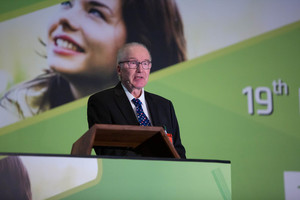Big Pharma moving into generic medicines may seem like a shrewd move, but it is not necessarily a recipe for success, Ms Francesca Bruce of Scrip News heard at the European Generic medicines Association (EGA) conference recently held in Barcelona, Spain.
EGA meeting Barcelona 2009: Big Pharma must not underestimate generics
Home/Conferences
|
Posted 16/09/2009
 0
Post your comment
0
Post your comment

Originator R & D pipelines are drying up, and to compensate several are moving into generics through joint ventures or acquisitions. For example, Pfizer recently expanded its alliance with the Indian firm Aurobindo and bought 15 injectables from Claris Lifesciences. Moreover, Novartis recently bought Ebewe's generic injectables business for US$1.2 billion (Euros 862 million).
Meanwhile, the language of the big innovators seems to be changing, which worryingly might reflect their concerns over their ability to innovate. “Before, when big companies talked about acquisitions, they would always talk about innovation and enriching pipelines; now its about cost saving and efficiency,” commented Dr Gerard Van Odijk, President and CEO of Teva Pharmaceuticals Europe.
However, this hybrid innovator/generic model has proven successful for Novartis. “95% of the time, it is a strength that Sandoz is part of Novartis,” said Mr Nick Haggar, Head of Commercial Operations, Western Europe for Sandoz. “It gives the firm the financial clout to invest in high-cost areas such as new markets and biosimilars, and in return, Sandoz helped the Novartis group treat around 850 million patients last year.”
But other firms may be underestimating the challenge. “Innovators are testing the water with generics ... but it is not a done deal that they will succeed”, said Dr Van Odijk. The size of big firms implies greater financial fire power, crucial for investing in expensive growth areas. Nevertheless, the generics industry, which is highly competitive, faces different challenges and operates within a different culture, and therefore requires different business strategies. It may be difficult for Big Pharma to shift their business models.
For example, the generics sector is “faster moving, and originators will have to adjust to this”, noted Mr Sigurdur Oli Olafsson, CEO of Actavis. “Generics companies have to be highly adaptable, ready to quickly switch from marketing branded products to marketing non-branded International Non-proprietary Name products depending on rapid change in the market. They would also need an aggressive approach to battling cost”, he said.
Source: Scrip
Guidelines
US guidance to remove biosimilar comparative efficacy studies
New guidance for biologicals in Pakistan and Hong Kong’s independent drug regulatory authority
Policies & Legislation
EU accepts results from FDA GMP inspections for sites outside the US
WHO to remove animal tests and establish 17 reference standards for biologicals
ASBM/GaBI 2024 webinar on BIOSIMILAR RED TAPE ELIMINATION ACT (S2305)

Home/Conferences Posted 05/11/2024
ASBM/GaBI 2023 webinar on INTERCHANGEABILITY DESIGNATION FOR BIOSIMILARS

Home/Conferences Posted 12/12/2023
The best selling biotechnology drugs of 2008: the next biosimilars targets








Post your comment